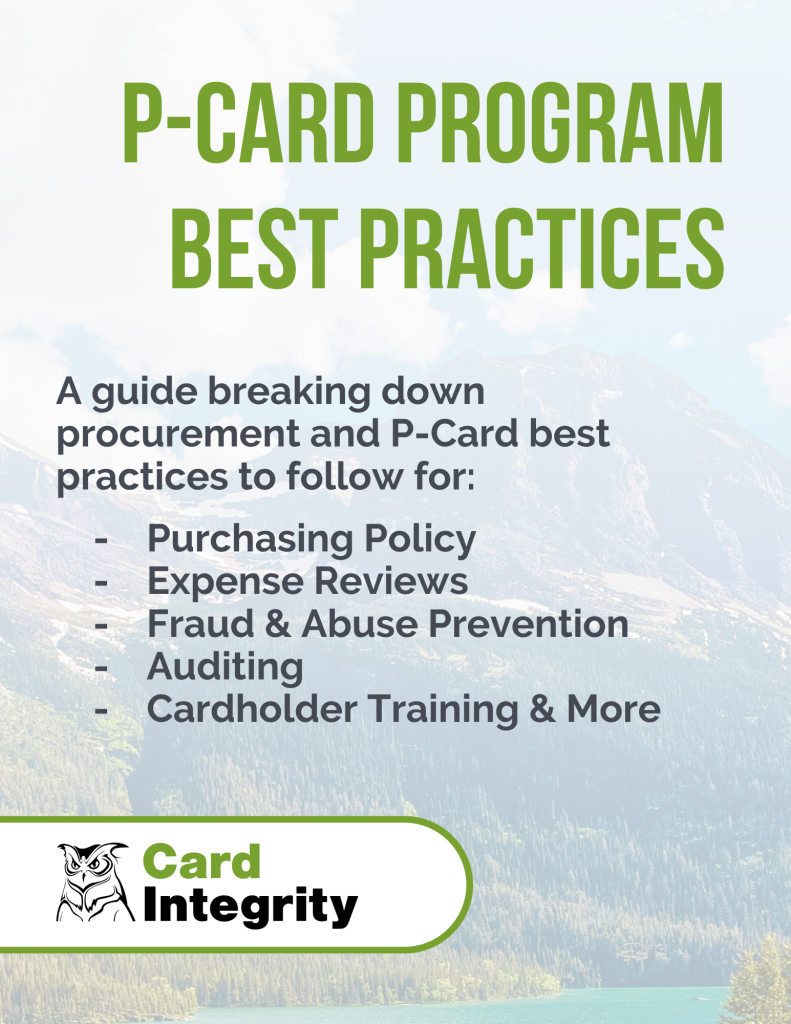P-Cards (sometimes known as purchasing cards or procurement cards) have both their advantages and their disadvantages. Here are the pros and cons of P-Cards you need to be aware of when venturing into the maintenance of a large card program or the growth of a P-Card program for your business or organization — as well as ways to beat down those unwanted, yet inevitable, cons.
P-Card Pros
Control. Thanks to assigned limits, approved vendors, and accessible paper trails, P-Cards are a powerful tool for maintaining control over your company’s spending. In the ACFE’s Report to the Nations, it takes at least 12 months on average to detect occupational fraud. Improving internal controls around P-Cards goes a long way in catching fraud when it happens, as opposed to a year or more later, if ever at all.
Information. The information and knowledge garnered from P-Card usage can be used in a variety of ways — from identifying fraud and misuse, to staying on top of your department budgets, to improving your bargaining power with vendors.
Convenience. Dedicated P-Cards for company spending makes life a lot easier for employees. They don’t have to worry about spending their own personal funds or being reimbursed for your business expenses. And pulling out a card to get it all done is quick and easy.
Efficiency. P-Cards can create a more efficient way to conduct transactions. Purchasing cycle times are reduced. Payments are received and clear much quicker, with more accurate predictability.
Rebates. Many P-Card programs and vendors offer points and cash back situations that can save your organization money in the long run.
P-Card Cons
Fraud and misuse. As easy as it is to use the P-Card for business expenses, it’s just as easy (and tempting) to use it for personal purchases as well. Some of this could be accidental and unintentional misuse, due to a poor understanding of how the system actually works. In other cases, it can be downright deliberate, fraudulent actions on the part of employees who are trying to take advantage of the system.
Policy development. No good P-Card system can exist without policies in place — and these take time to create, as well as to work out the “bugs” in the system. Reviews need to take place regularly to determine which policies make sense, which need to go, and what still needs to be added. While absolutely necessary, developing and reviewing these policies can be a cumbersome responsibility.
Training. While training could solve much of the misuse mentioned above, it takes time and expertise — all of which needs to be figured into the P-Card program equation. Without it, the cycle of misuse can continue and even worsen. But some companies might decide not to train or re-train their cardholders, simply to avoid the added stress on their already burdened and overtaxed managerial staff.
Reviews. Yet again, a solution becomes the problem. The benefits of control and information become null and void if no one is monitoring and reviewing that information. Manual efforts also make for greater challenges to the review process of a large card program, especially when that review process contains thousands or more transactions per month. But, of course, reviews take both time and personnel to complete, and it’s possible that your company has neither to spare.
Eliminating P-Card Cons
The pros and cons of p-cards don’t have to be a constant challenge to your card program. Now that you are aware of them it’s time to resolve any issues. The good news is that the cons associated with P-Cards can be avoided, with the proper monitoring and timely, relevant communication.
For example, to reduce abuse, a competent monitoring system needs to be applied. Card Integrity’s DataWISE and ReceiptWISE programs thoroughly monitor, review, and validate all data generated by your P-Card program. In doing so, non-compliant and fraudulent behaviors are quickly identified.
Likewise, misuse can be greatly reduced via adequate training. This can be accomplished by Card Integrity’s TrainingWISE. Providing such training as a third-party outlet can alleviate any additional burdens placed on management.
And similarly, Card Integrity can help you develop policies and procedures for your P-Card program — and then, will help you further by getting the word out to employees, via various means of communication and, of course, training.
When the cons are addressed, P-Card programs become all the more “win-win” and an attractive alternative to the way you might be currently handling your expenses.
For More Tips, Download Our P-Card Best Practices eGuide
Smarter spending begins with the right controls in place. Make the most of your P-Cards with a comprehensive best practices guide. Our detailed guide groups P-Card program best practices into seven distinct categories:
- Policy
- Management
- Infrastructure
- Audit
- Submission
- Purchasing
- Training
These tips can help streamline your card program and bring efficiency to the P-Card process. Accomplish this while preparing your card program with scalability and security in mind. Set up your card program for success! Make the most of your P-Cards by downloading our FREE eGuide today.
Article originally published July 30, 2018. Updated March 31, 2025 with more relevant statistics and information.




